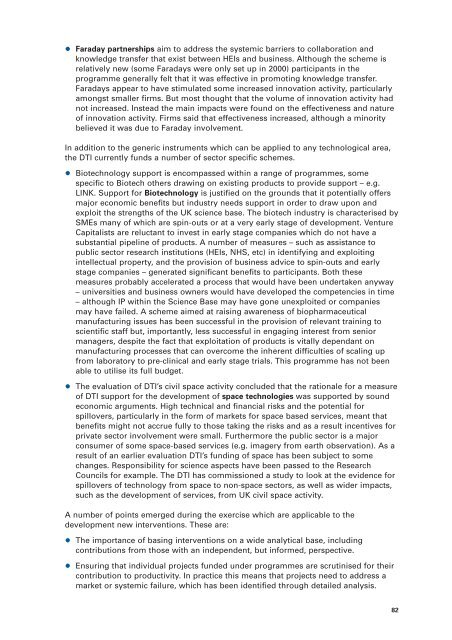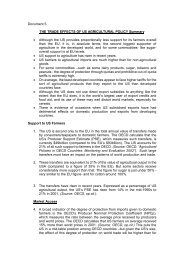Competing in the Global Economy – The Innovation Challenge
Competing in the Global Economy – The Innovation Challenge
Competing in the Global Economy – The Innovation Challenge
You also want an ePaper? Increase the reach of your titles
YUMPU automatically turns print PDFs into web optimized ePapers that Google loves.
• Faraday partnerships aim to address <strong>the</strong> systemic barriers to collaboration and<br />
knowledge transfer that exist between HEIs and bus<strong>in</strong>ess. Although <strong>the</strong> scheme is<br />
relatively new (some Faradays were only set up <strong>in</strong> 2000) participants <strong>in</strong> <strong>the</strong><br />
programme generally felt that it was effective <strong>in</strong> promot<strong>in</strong>g knowledge transfer.<br />
Faradays appear to have stimulated some <strong>in</strong>creased <strong>in</strong>novation activity, particularly<br />
amongst smaller firms. But most thought that <strong>the</strong> volume of <strong>in</strong>novation activity had<br />
not <strong>in</strong>creased. Instead <strong>the</strong> ma<strong>in</strong> impacts were found on <strong>the</strong> effectiveness and nature<br />
of <strong>in</strong>novation activity. Firms said that effectiveness <strong>in</strong>creased, although a m<strong>in</strong>ority<br />
believed it was due to Faraday <strong>in</strong>volvement.<br />
In addition to <strong>the</strong> generic <strong>in</strong>struments which can be applied to any technological area,<br />
<strong>the</strong> DTI currently funds a number of sector specific schemes.<br />
• Biotechnology support is encompassed with<strong>in</strong> a range of programmes, some<br />
specific to Biotech o<strong>the</strong>rs draw<strong>in</strong>g on exist<strong>in</strong>g products to provide support <strong>–</strong> e.g.<br />
LINK. Support for Biotechnology is justified on <strong>the</strong> grounds that it potentially offers<br />
major economic benefits but <strong>in</strong>dustry needs support <strong>in</strong> order to draw upon and<br />
exploit <strong>the</strong> strengths of <strong>the</strong> UK science base. <strong>The</strong> biotech <strong>in</strong>dustry is characterised by<br />
SMEs many of which are sp<strong>in</strong>-outs or at a very early stage of development. Venture<br />
Capitalists are reluctant to <strong>in</strong>vest <strong>in</strong> early stage companies which do not have a<br />
substantial pipel<strong>in</strong>e of products. A number of measures <strong>–</strong> such as assistance to<br />
public sector research <strong>in</strong>stitutions (HEIs, NHS, etc) <strong>in</strong> identify<strong>in</strong>g and exploit<strong>in</strong>g<br />
<strong>in</strong>tellectual property, and <strong>the</strong> provision of bus<strong>in</strong>ess advice to sp<strong>in</strong>-outs and early<br />
stage companies <strong>–</strong> generated significant benefits to participants. Both <strong>the</strong>se<br />
measures probably accelerated a process that would have been undertaken anyway<br />
<strong>–</strong> universities and bus<strong>in</strong>ess owners would have developed <strong>the</strong> competencies <strong>in</strong> time<br />
<strong>–</strong> although IP with<strong>in</strong> <strong>the</strong> Science Base may have gone unexploited or companies<br />
may have failed. A scheme aimed at rais<strong>in</strong>g awareness of biopharmaceutical<br />
manufactur<strong>in</strong>g issues has been successful <strong>in</strong> <strong>the</strong> provision of relevant tra<strong>in</strong><strong>in</strong>g to<br />
scientific staff but, importantly, less successful <strong>in</strong> engag<strong>in</strong>g <strong>in</strong>terest from senior<br />
managers, despite <strong>the</strong> fact that exploitation of products is vitally dependant on<br />
manufactur<strong>in</strong>g processes that can overcome <strong>the</strong> <strong>in</strong>herent difficulties of scal<strong>in</strong>g up<br />
from laboratory to pre-cl<strong>in</strong>ical and early stage trials. This programme has not been<br />
able to utilise its full budget.<br />
• <strong>The</strong> evaluation of DTI’s civil space activity concluded that <strong>the</strong> rationale for a measure<br />
of DTI support for <strong>the</strong> development of space technologies was supported by sound<br />
economic arguments. High technical and f<strong>in</strong>ancial risks and <strong>the</strong> potential for<br />
spillovers, particularly <strong>in</strong> <strong>the</strong> form of markets for space based services, meant that<br />
benefits might not accrue fully to those tak<strong>in</strong>g <strong>the</strong> risks and as a result <strong>in</strong>centives for<br />
private sector <strong>in</strong>volvement were small. Fur<strong>the</strong>rmore <strong>the</strong> public sector is a major<br />
consumer of some space-based services (e.g. imagery from earth observation). As a<br />
result of an earlier evaluation DTI’s fund<strong>in</strong>g of space has been subject to some<br />
changes. Responsibility for science aspects have been passed to <strong>the</strong> Research<br />
Councils for example. <strong>The</strong> DTI has commissioned a study to look at <strong>the</strong> evidence for<br />
spillovers of technology from space to non-space sectors, as well as wider impacts,<br />
such as <strong>the</strong> development of services, from UK civil space activity.<br />
A number of po<strong>in</strong>ts emerged dur<strong>in</strong>g <strong>the</strong> exercise which are applicable to <strong>the</strong><br />
development new <strong>in</strong>terventions. <strong>The</strong>se are:<br />
• <strong>The</strong> importance of bas<strong>in</strong>g <strong>in</strong>terventions on a wide analytical base, <strong>in</strong>clud<strong>in</strong>g<br />
contributions from those with an <strong>in</strong>dependent, but <strong>in</strong>formed, perspective.<br />
• Ensur<strong>in</strong>g that <strong>in</strong>dividual projects funded under programmes are scrut<strong>in</strong>ised for <strong>the</strong>ir<br />
contribution to productivity. In practice this means that projects need to address a<br />
market or systemic failure, which has been identified through detailed analysis.<br />
82
















